-
Posts
1,761 -
Joined
-
Last visited
-
Days Won
106
Content Type
Profiles
Forums
Events
Everything posted by Bint e Aisha
-
-
Kia Islam main vote dena jaiz hai? (Is it allowed to vote in Islam?) https://youtu.be/ZDq5VxyJ9nk
-
Question: My friends often say or text "Salam" instead of "Assalamu alaikum". Is it ok to say "salam" only? Do we have to reply if someone says "salam" only? Answer: بِسْمِ اللهِ الرَّحْمنِ الرَّحِيْم In the Name of Allah, the Most Gracious, the Most Merciful. Saying "salam" is not the same as saying "assalamu alaikum"; and one will not get the reward of saying "assalamu alaikum" by saying "salam". Moreover, when someone is greeted with "assalamu alaikum", it is compulsory on him to reply (by saying "wa alaikumus-salaam" etc). However, if one is greeted with "salam", it is not compulsory to reply. This is because saying only "salam" is not the sunnah method of greeting someone. The above also applies to writing and texting "salam".[1] And Allah Ta'ala knows best Mufti Faizal Riza 5/2/2013 Darul Ifta Australia www.mufti-online.net [1] في الدر المختار: صرّح في الضياء بوجوب الرد في بعضها وبعدمه في قوله سلام عليكم بجزم الميم. وفي الشامي: قوله بجزم الميم) كأنه لمخالفته السنة، فعلى هذا لو رفع الميم بلا تنوين ولا تعريف كان كجزم الميم لمخالفته السنة أيضا. اهـ..... لكن قال في الظهيرية: ولفظ السلام: "السلام عليكم" أو "سلام عليكم" بالتنوين، وبدون هذين - كما يقول الجهال - لا يكون سلاما اهـ ( رد المحتار: 1/ 618 ط سعيد ) وفي الحظر والإباحة من الدر المختار: وقدّمنا في باب ما يفسد الصلاة كراهته في نيف وعشرين موضعا وأنه لا يجب رد سلام عليكم بجزم الميم. وقال الشامي: (قوله بجزم الميم) الأولى بسكون الميم، قال ط: وكأن عدم الوجوب لمخالفته السنة التي جاءت بالتركيب العربي ومثله فيما يظهر الجمع بين أل والتنوين اهـ. وظاهر تقييده بجزم الميم أنه لو نوّن المجرّد من أل كما هو تحية الملائكة لأهل الجنة يجب الرد، فيكون له صيغتان، وهو ظاهر ما قدمناه سابقا عن التتارخانية، ثم رأيت في الظهيرية: ولفظ السلام في المواضع كلها "السلام عليكم" أو "سلام عليكم" بالتنوين، وبدون هذين - كما يقول الجهّال - لا يكون سلاما ( رد المحتار: 6/ 415 ط سعيد ) في مرقاة المفاتيح: قال النووي: اعلم أن أفضل السلام أن يقول: السلام عليكم ورحمة الله وبركاته ..... وأقلّ السلام أن تقول: السلام عليكم، وإن قال السلام عليك أو سلام عليك حصل أيضا .... ( وبعد صفحتين) .... ( «فإن تسليم اليهود الإشارة بالأصابع، وتسليم النصارى الإشارة بالأكف» ) . بفتح فضم جمع كف، والمعنى: لا تشبهوا بهم جميعا في جميع أفعالهم خصوصا في هاتين الخصلتين، ولعلهم كانوا يكتفون في السلام أو رده أو فيهما بالإشارتين من غير نطق بلفظ السلام الذي هو سنة آدم وذريته من الأنبياء والأولياء، وكأنه - صلى الله عليه وسلم - كوشف له أن بعض أمته يفعلون ذلك، أو مثل ذلك من الانحناء أو مطأطأة الرأس، أو الاكتفاء بلفظ السلام فقط (مرقاة المفاتيح: 8/ 428، 430 ط مكتبة رشيدية )
-
فجر کی جماعت کھڑی ہونے کے بعد فجر کی سنتیں کب پڑھے سوال:مفتی صاحب ایک مسلۂ درپیش ہے.کہ جب فجر کی جماعت کھڑی ہو جائے تو فجر کی سنتیں پڑھ سکتے ہیں اس وقت اگرنہیں پڑھ سکتے تو پھر کیا اشراق کے وقت پڑھے؟جواب: فجر کےسنتوں کی تاکید بہت زیادہ ہے حدیث شریف میں ہے کہ فجرسےپہلےکی دوسنتیں نہ چھوڑو اگرچہ گھوڑےتمہیں روندڈالیں اس لئےاگراس کو ایک رکعت بلکہ محققین حنفیہ کے نزدیک تشہد ملنے کی امید بھی ہو توفجرکی سنتیں ترک نہ کرے بلکہ مسجد سے باہر جگہ ہو تو وہاں ورنہ مسجد کے دروازے کے پاس یا جتنا جماعت کی صفوں سے دور ہو کر ادا کرنا ممکن ہو وہاں کسی ستون وغیرہ کے پیچھے پڑھ لے جماعت کے دوران صفوں کے متصل کھڑے ہوکر سنت پڑھنا مکروہ ہے اس سے بچنا چاہئے۔تاہم اگر کسی کےفجرکی سنتیں چھوٹ جائیں توطلوع آفتاب سےپہلےپڑھناجائزنہیں البتہ طلوع آفتاب کےبعدجب مکروہ وقت ختم ہوجائے اس وقت پڑھے طلوع آفتاب سےپہلےنہ پڑھے کیونکہ بہت سی احادیث میں فجراورعصر کےبعد نوافل پڑھنےکی ممانعت آئی ہے۔سنن إبن ماجه365/1عن أبي هريرة : – ان النبي صلى الله عليه و سلم نام عن ركعتي الفجر . فقضاهما بعد ما طلعت الشمس إعلاءالسنن 21/1عن علي رضي الله عنه قال كان رسول ﷺ یصلی فی أثرکل صلوۃ مکتوبۃ رکعتین إلاالفجروالعصرحاشية ابن عابدين (2 / 56)(وإذا خاف فوت) ركعتي (الفجر لاشتغاله بسنتها تركها) لكون الجماعة أكمل (وإلا) بأن رجا إدراك ركعة في ظاهر المذهب. وقيل التشهد واعتمده المصنف والشرنبلالي تبعا للبحر لكن ضعفه في النهر (لا) يتركها بل يصليها عند باب المسجد إن وجد مكانا وإلا تركها لأن ترك المكروه مقدم على فعل السنة.مراقي الفلاح – (1 / 195)ومن حضر و ) كان ( الإمام في صلاة الفرض اقتدى به ولا يشتغل عنه بالسنة ) ۔۔۔۔۔۔۔۔۔( إلا في الفجر ) فإنه يصلي سنته ولو في المسجد بعيدا عن الصف ( إن أمكن فوته ) ولو بإدراكه في التشهد ۔۔۔۔۔۔۔( وإن لم يأمن ) فوت الإمام باشتغاله بسنة الفجر ( تركها ) واقتدى لأن ثواب الجماعة أعظم من فضيلة ركعتي الفجر لأنها تفضل الفرض منفردا بسبع وعشرين ضعفا لا تبلغ ركعة الفجر ضعفا واحدا منها ( ولم تقض سنة الفجر إلا بفوتها مع الفرض ) إلى الزوالردالمختار57/2)والحاصل أن السنة في سنة الفجر أن يأتي بها في بيته، وإلا فإن كان عند باب المسجد مكان صلاها فيه وإلا صلاها في الشتوي أو الصيفي إن كان للمسجد موضعان وإلا فخلف الصفوف عند سارية لكن فيما إذا كان للمسجد موضعان والإمام في أحدهما ذكر في المحيط أنه قيل لا يكره لعدم مخالفة القوم وقيل يكره لأنهما كمكان واحد. قال في القنية: لو خاف أنه لو صلى سنة الفجر بوجهها تفوته الجماعة، ولو اقتصر فيها بالفاتحة وتسبيحة في الركوع والسجود يدركها فله أن يقتصر عليها لأن ترك السنة جائز لإدراك الجماعة، فسنة السنة أولى. وعن القاضي الزرنجري: لو خاف أن تفوته الركعتان يصلي السنة ويترك الثناء والتعوذ وسنة القراءة، ويقتصر على آية واحدة ليكون جمعا بينهما وكذا في سنة الظهر. اهـ. وفيها أيضا: صلى سنة الفجر وفاته الفجر لا يعيد السنة إذا قضى الفجر.ردالمختار 57/2قوله ولا يقضيها إلا بطريق التبعية إلخ) أي لا يقضي سنة الفجر إلا إذا فاتت مع الفجر فيقضيها تبعا لقضائه لو قبل الزوال؛ وما إذا فاتت وحدها فلا تقضى قبل طلوع الشمس بالإجماع، لكراهة النفل بعد الصبح. وأما بعد طلوع الشمس فكذلك عندهما. وقال محمد: أحب إلي أن يقضيها إلى الزوال كما في الدرر. قيل هذا قريب من الاتفاق لأن قوله أحب إلي دليل على أنه لو لم يفعل لا لوم عليه. وقالا: لا يقضي، وإن قضى فلا بأس به، كذا في الخبازيةالفتاوى الهندية – (1/112،رشيدية) والسنن إذا فاتت عن وقتها لم يقضها إلا ركعتي الفجر إذا فاتتا مع الفرض يقضيهما بعد طلوع الشمس إلى وقت الزوال ثم يسقط هكذا في محيط السرخسي وهو الصحيح . هكذا في البحر الرائق وإذا فاتتا بدون الفرض لا يقضى عندهما خلافا لمحمد رحمه الله تعالى . كذا في محيط السرخسي . http://www.suffahpk.com/fajar-ki-jamat-khari-hony-k-baad-fajar-ki-sunnaty-kab-parhy/
-
کسی کی حوصلہ افزائی کےلیے تالی بجانے کا حکم سوال : کسی کی حوصلہ افزائی کےلیے تالی بجانا کیساہے ؟ کیاکسی صورت میں اس کی گنجائش ہے؟براہ کرم مفصل اورمدلل تحریر فرمائیں ۔ جواب : فی نفسہ عام حالات میں تالی بجانے کی ممانعت کی کوئی دلیل شریعت میں نہیں ملتی،البتہ نماز کی حالت میں مردوں کوتالی بجانے سےمنع کیاگیاہے۔جہاں تک سوال کسی کی حوصلہ افزائی کےلیے تالی بجانے سےمتعلق ہے۔سواس کا جواب یہ ہے کہ یہ طریقہ غیرمسلموں سےشروع ہواہے،اگرچہ بعد مسلمانوں میں بھی رائج ہوگیاہے،تواس مشابہت کی وجہ سے اس میں کراہت تنزیہی معلوم ہوتی ہے اس لیے بہتریہ ہے کہ کوئی دوسرا مناسب طریقہ اختیار کیاجائے ،تاہم اگرکوئی تالی بجانے کواختیار کرےتواسے معصیت نہیں کہاجاسکتا۔ ( تبویب : (1452/89) حاشیہ بن عابدین : (319:6) الموسوعۃ الفقھیۃ الکویتیۃ : (82:12) http://www.suffahpk.com/kisi-ki-hosla-afzai-k-liy-tali-bajany-ka-hukum/
-
Question Assalamu alaykum wa rehmatullahi wa barkatuhu. There is a chit scheme.In this lets say about 10people and 1 agent will be involved..these 10 people will pay 10,000 each for 10 months(that means 100,000 (10,000*10people’s money) will be gathered each month).The agent will take 4000 as commission each month for maintaining this process. Money(96,000) will be given to the people each month who needs it the most but the person who takes the money should pay 1,000 extra for the remaining months. say if x takes the money(96,000) in the 1st month then he will pay extra 1000 for the remaining 9 months. 2nd person who takes money in 2nd month will get 96,000+1,000(1st persons extra money) and pays 1000 from 3rd month, 3rd person will get (96,000+1,000(1st persons) +1,000(2nd person) and so on..So like that the last person will get (96,000+(1,000*9)) Note that the last person will not pay anything extra but gets 9000 extra apart from 96000 which he deserves. My question is, Is this kind of transactions appropriate.If it is permissible then why and if it is not permissible then why.Please explain with reference. Hope that I am clear..waiting for a reply. Jazak allah khair Answer Wa’alaykum as Salam wa rahmatullahi wa barakatuhu, The scheme outlined in your query is not permissible due to two factors: Interest Gambling The interest aspect comes to the fore when a person withdraws his money towards the end, or even last, he receives his initial capital plus the 1000 ‘penalty’ which the other members had to pay in the previous months. The only reason he is getting all this additional funds is because his money was in the fund for a longer period. Money in exchange of money is interest, which is clearly prohibited in Shariah. The gambling aspect is due to the fact that the person who really gains the most is the person who is lucky enough to remain till the end of the ten months. Those who cash up in the first few months actually lose out. In other chit funds, members have to bid, and the one who is willing to take the biggest lose can cash out first. By entering the chit scheme, each person hopes and wishes to last till the end and derive the most. But, due to circumstances, a member will be forced to leave early, and take the loss. This too is not permissible in Shariah. References الَّذِينَ يَأْكُلُونَ الرِّبَا لَا يَقُومُونَ إِلَّا كَمَا يَقُومُ الَّذِي يَتَخَبَّطُهُ الشَّيْطَانُ مِنَ الْمَسِّ ۚ ذَٰلِكَ بِأَنَّهُمْ قَالُوا إِنَّمَا الْبَيْعُ مِثْلُ الرِّبَا ۗ وَأَحَلَّ اللَّهُ الْبَيْعَ وَحَرَّمَ الرِّبَا ۚ فَمَن جَاءَهُ مَوْعِظَةٌ مِّن رَّبِّهِ فَانتَهَىٰ فَلَهُ مَا سَلَفَ وَأَمْرُهُ إِلَى اللَّهِ ۖ وَمَنْ عَادَ فَأُولَٰئِكَ أَصْحَابُ النَّارِ ۖ هُمْ فِيهَا خَالِدُونَ (275) يَمْحَقُ اللَّهُ الرِّبَا وَيُرْبِي الصَّدَقَاتِ ۗ وَاللَّهُ لَا يُحِبُّ كُلَّ كَفَّارٍ أَثِيمٍ (276) إِنَّ الَّذِينَ آمَنُوا وَعَمِلُوا الصَّالِحَاتِ وَأَقَامُوا الصَّلَاةَ وَآتَوُا الزَّكَاةَ لَهُمْ أَجْرُهُمْ عِندَ رَبِّهِمْ وَلَا خَوْفٌ عَلَيْهِمْ وَلَا هُمْ يَحْزَنُونَ (277) يَا أَيُّهَا الَّذِينَ آمَنُوا اتَّقُوا اللَّهَ وَذَرُوا مَا بَقِيَ مِنَ الرِّبَا إِن كُنتُم مُّؤْمِنِينَ (278) فَإِن لَّمْ تَفْعَلُوا فَأْذَنُوا بِحَرْبٍ مِّنَ اللَّهِ وَرَسُولِهِ ۖ وَإِن تُبْتُمْ فَلَكُمْ رُءُوسُ أَمْوَالِكُمْ لَا تَظْلِمُونَ وَلَا تُظْلَمُونَ (279) يَا أَيُّهَا الَّذِينَ آمَنُوا إِنَّمَا الْخَمْرُ وَالْمَيْسِرُ وَالْأَنصَابُ وَالْأَزْلَامُ رِجْسٌ مِّنْ عَمَلِ الشَّيْطَانِ فَاجْتَنِبُوهُ لَعَلَّكُمْ تُفْلِحُونَ (90) عن أبى هريرة قال قال النبى -صلى الله عليه وسلم- ح وحدثنا وهب بن بقية أخبرنا خالد عن داود – يعنى ابن أبى هند – وهذا لفظه عن سعيد بن أبى خيرة عن الحسن عن أبى هريرة أن رسول الله -صلى الله عليه وسلم- قال « ليأتين على الناس زمان لا يبقى أحد إلا أكل الربا فإن لم يأكله أصابه من بخاره ». قال ابن عيسى « أصابه من غباره ». (أخرجه أبو داود في سننه (3/ 248) عن جابر قال لعن رسول الله صلى الله عليه وسلم آكل الربا وموكله وكاتبه وشاهديه وقال هم سواء (أخرجه مسلم في صحيحه – (3/ 1219) MUFTI ISMAIL MOOSA https://www.fatwaa.com/chit-funds/
-
- chit funds
- gambling
-
(and 2 more)
Tagged with:
-
Do Not Undermine Sins Every sin is serious and detrimental, and is a means of distancing from Allah. After showering us with so many favours and bounties, it does not behove us to break any commandment of Allah. Bilal bin Sa’d (may Allah be pleased with him) said, لا تنظر إلى صغر الخطيئة ولكن انظر من عصيت (شعب الإيمان – (1/ 269) “Don’t look at the insignificance of the sin, but look at the greatness of the one who you are disobeying.” (Shu’ab al-Iman, 1/269) Furthermore, a seemingly ‘small’ sin can be magnified due to other reasons. For example, treating a sin as trivial or inconsequential is enough to intensify that sin to such an extent that it can become more destructive than even relatively greater sins. It is precisely for this reason that Sahabah were extremely cautious not to disobey Allah. Anas (may Allah be pleased with him) said, إنكم لتعملون أعمالا هي أدق في أعينكم من الشعر إن كنا لنعدها على عهد النبي صلى الله عليه وسلم من الموبقات قال أبو عبد الله يعني بذلك المهلكات (أخرجه البخاري في صحيحه – (8/ 103) “You perpetrate certain sins and regard those sins to be more insignificant than a straw. But, at the time of the Prophet (sallallahu alayhi wa sallam) we used to count those sins among those things that can destroy a man.” (Sahih al-Bukhari, 8 / 103) Similarly, ‘Abdullah bin Mas’ud (may Allah be pleased with him) said, عبد الله بن مسعود حديثين أحدهما عن النبي صلى الله عليه وسلم والآخر عن نفسه قال إن المؤمن يرى ذنوبه كأنه قاعد تحت جبل يخاف أن يقع عليه وإن الفاجر يرى ذنوبه كذباب مر على أنفه فقال به هكذا قال أبو شهاب بيده فوق أنفه (أخرجه البخاري في صحيحه – (8/ 67) “A believer treats a sin as if it is a mountain over his head that may fall on him any moment. Whereas a regular violator looks at them as a fly that perked on his nose and he waived it away with his hand.” (Sahih al-Bukhari, 8 / 67) By undermining any sin, a person will tend to commit that sin more frequently. Thus, the prophet (sallahu alayhi wa sallam) said, عن عبد الله بن مسعود أن رسول الله صلى الله عليه وسلم قال إياكم ومحقرات الذنوب فإنهن يجتمعن على الرجل حتى يهلكنه (أخرجه أحمد في مسنده – (6/ 367) “Beware of undermining sins. Verily, they gather upon a man until they destroy him.” (Musnad Ahmad, 6/367) In short, every sin is damaging and a rebellion in its own right, and the conscientious Muslim must strive to avoid it at all cost. The devil makes us trivialize sins so that we do not repent to Allah.
-
Putting water on the grave and enclosing the grave Question Assalamualaikum. Why do we put water in the graves when we go to the cabrestaan? Just saying because the mayyit is really down and we just put some water. Is there anything you can tell me? My father tells me that we should start from the head side towards the feet. Can we put some iron bars at the side of the grave so that the grave may be well recognized? Instead of only sand. Som Answer In the Name of Allah, the Most Gracious, the Most Merciful. As-salāmu ‘alaykum wa-rahmatullāhi wa-barakātuh. 1) It is not necessary to put water on the grave. If putting water on the grave is regarded as compulsory, it will be regarded as a Bidah. Generally, people water the plants on the grave to keep the plants alive and fresh. A fresh plant makes Zikr of Allah and invokes the mercy of Allah.[1] 2) It is not permissible[2] to put iron bars around the grave. Shari’ah encourages us to keep graves simple. One may place a headstone with the name of the deceased for identification[3] purposes. Consider the following Hadith[4] عن جابر قال نهى النبي صلى الله عليه وسلم أن تجصص القبور وأن يكتب عليها وأن يبنى عليها وأن توطأ Translation: Rasulullah Sallallahu Alaihi wa Sallam prohibited plastering graves, writing on them, building over them, and treading on them." Hadith1052 Tirmidhi And Allah Ta’āla Knows Best Muhammad Yaasir Yunus Hussen Student Darul Iftaa Quelimane - Mozambique Checked and Approved by, Mufti Ebrahim Desai. [1] عَنْ ابْنِ عَبَّاسٍ قَالَ: مَرَّ رَسُولُ اللَّهِ صَلَّى اللهُ عَلَيْهِ وَسَلَّمَ بِقَبْرَيْنِ فَقَالَ: «إِنَّهُمَا لَيُعَذَّبَانِ وَمَا يُعَذَّبَانِ فِي كَبِيرٍ، أَمَّا أَحَدُهُمَا فَكَانَ لَا يَسْتَبْرِئُ مِنْ بَوْلِهِ، وَأَمَّا الْآخَرُ فَكَانَ يَمْشِي بِالنَّمِيمَةِ»، ثُمَّ أَخَذَ جَرِيدَةً رَطْبَةً فَشَقَّهَا نِصْفَيْنِ، ثُمَّ غَرَزَ فِي كُلِّ قَبْرٍ وَاحِدَةً، فَقَالُوا: يَا رَسُولَ اللَّهِ، لِمَ صَنَعْتَ هَذَا؟ فَقَالَ: لَعَلَّهُمَا أَنْ يُخَفَّفَ عَنْهُمَا مَا لَمْ يَيْبَسَا .سنن النسائي (4/ 106) [2] فروع: في " المحيط ": لا يجص القبر ولا يطين، في رواية الكرخي، وكره التجصيص الحسن والنخعي، والثوري، ومالك، والشافعي، وأحمد، وأباح أحمد التطيين. وفي " منية المفتي ": المختار أنه لا يكره، وكره أبو حنيفة أن يبنى على القبر أو يوطأ عليه، أو يجلس عليه، أو ينام عليه، أو يقضى عليه حاجة الإنسان من بول أو غائط، أو يعلم بعلامة، أو يصلى إليه، أو يصلى بين القبور. وحمل الطحاوي الجلوس المنهي عنه على الجلوس لقضاء الحاجة وكره أبو يوسف أن يكتب عليه. وفي " قاضي خان " ولا بأس بكتابة شيء، أو بوضع الأحجار؛ ليكون علامة. وفي " الميحط ": لا بأس بالكتابة عند العذر. البناية شرح الهداية (3/ 259) [3] فتاوى يوسفيه ج٢ص١٠٤–١٠٢ (قَوْلُهُ وَلَا يُجَصَّصُ) لِحَدِيثِ جَابِرٍ «نَهَى رَسُولُ اللَّهِ - صَلَّى اللَّهُ عَلَيْهِ وَسَلَّمَ - أَنْ يُجَصَّصَ الْقَبْرُ وَأَنْ يُقْعَدَ عَلَيْهِ وَأَنْ يُبْنَى عَلَيْهِ وَأَنْ يُكْتَبَ عَلَيْهِ» وَأَنْ يُوطَأَ وَالتَّجْصِيصُ طَلْيُ الْبِنَاءِ بِالْجِصِّ بِالْكَسْرِ وَالْفَتْحِ كَذَا فِي الْمُغْرِبِ، وَفِي الْخُلَاصَةِ، وَلَا يُجَصَّصُ الْقَبْرُ وَلَا يُطَيَّنُ، وَلَا يُرْفَعُ عَلَيْهِ بِنَاءٌ قَالُوا أَرَادَ بِهِ السَّفَطَ الَّذِي يُجْعَلُ فِي دِيَارِنَا عَلَى الْقَبْرِ وَقَالَ فِي الْفَتَاوَى الْيَوْمَ اعْتَادُوا السَّفَطَ، وَلَا بَأْسَ بِالتَّطْيِينِ. اهـ. وَفِي الظَّهِيرِيَّةِ، وَلَوْ وُضِعَ عَلَيْهِ شَيْءٌ مِنْ الْأَشْجَارِ أَوْ كُتِبَ عَلَيْهِ شَيْءٌ فَلَا بَأْسَ بِهِ عِنْدَ الْبَعْضِ اهـ. وَالْحَدِيثُ الْمُتَقَدِّمُ يَمْنَعُ الْكِتَابَة فَلْيَكُنْ الْمُعَوَّلَ عَلَيْهِ لَكِنْ فَصَّلَ فِي الْمُحِيطِ فَقَالَ: وَإِنْ اُحْتِيجَ إلَى الْكِتَابَةِ حَتَّى لَا يَذْهَبَ الْأَثَرُ وَلَا يُمْتَهَنُ فَلَا بَأْسَ بِهِ فَأَمَّا الْكِتَابَةُ مِنْ غَيْرِ عُذْرٍ فَلَا اهـ البحر الرائق شرح كنز الدقائق ومنحة الخالق وتكملة الطوري (2/ 209) 23 - يُكْرَهُ تَجْصِيصُ الْقُبُورِ وَالْبِنَاءُ عَلَيْهَا اتِّفَاقًا بَيْنَ الْفُقَهَاءِ؛ لِقَوْل جَابِرٍ رَضِيَ اللَّهُ عَنْهُ: نَهَى النَّبِيُّ صَلَّى اللَّهُ عَلَيْهِ وَسَلَّمَ أَنْ يُجَصَّصَ الْقَبْرُ، وَأَنْ يُبْنَى عَلَيْهِ (3) وَلأَِنَّ ذَلِكَ مِنَ الْمُبَاهَاةِ وَزِينَةِ الْحَيَاةِ الدُّنْيَا، وَتِلْكَ مَنَازِل الآْخِرَةِ، وَلَيْسَتْ بِمَوْضِعٍ لِلْمُبَاهَاةِ. وَكَذَا يُكْرَهُ تَطْيِينُهَا عِنْدَ جُمْهُورِ الْفُقَهَاءِ، وَفِي قَوْلٍ عِنْدَ الْحَنَفِيَّةِ جَوَازُهُ. (4) الموسوعة الفقهية الكويتية (11/ 275) [4] صحيح وضعيف سنن الترمذي (3/ 52، بترقيم الشاملة آليا) Askimam
-

Using Social Media - A Responsibility
Bint e Aisha replied to ummtaalib's topic in General Islamic Articles
How many "likes"? By Sister Sumaiyah Seedat How many times have we posted a picture that we thought to be something great and to our surprise the picture receives a meager 10 "likes"?...Instant removal ! In our quest to boost our self-confidence, we have become egotistical and as fake as the filters we apply to our pictures on social media. Sadly, our lives have come down to us needing constant validation from others, some of whom are complete strangers to us! This is unhealthy because we build unrealistic views on life and suddenly what Allah Ta'ala has given to us is not enough. We find fault with our complexion, our weight, height even the colour of our hair requires some sort of modification. We are indeed so vulnerable. The filters applied to pictures are deceptive and brainwashing and yet so many of us strive to look that way. "You will never look like the girl on the front page of the magazine, as even that girl doesn't look like her original self" The harms of abusing social media are not only the inferiority-complex it gives its users, it also commonly leads to a narcissistic approach to life. One has reduced their self-worth to the amount of 'likes' they accumulate on their 'selfies' and thus feeding their ego's when they have indeed overlooked that "Allah does not like the arrogant, the boastful" (Qur'an An-Nisa, 4:36). Really, our beauty is sacred; we are beautiful because we are the work of Allah! You do not need validation from any human being. The next time you are about to post a 'selfie' that you are convinced is going to get you many likes, ask yourself 3 things: 1. Would I be comfortable showing this picture to my children? 2. Would I be pleased if they grew up to do the same? 3. If I were to take my last breath tomorrow, would my pictures work for or against me in my grave? Islam is not about doom and gloom, but in fact it's about being in peace and harmony with our Creator 'Ar-Rahmaan'. "Never despair of the mercy of your Lord"(Qur'an Az-Zumar 39:53) No matter how far you may have strayed, do not let Shaitaan (Satan) misguide you into thinking that there is no way back, the doors of forgiveness are always open. Always remember, a pretty face is temporary and inner beauty more important than outer beauty. Rather aspire to "be so beautiful that others can't take their HEARTS off you" Source: eislam- 15 replies
-

Striving for spiritual progress
Bint e Aisha replied to Bint e Aisha's topic in Matters of the Heart
Dr76 writes: (Here) بسم الله الرحمن الرحيم Subhan Allah.. Ajeeb.. i was pondering over this thought today.. like how Allah سبحانه وتعالى makes us turn towards him.. Like a mother teaching a child to walk.. the child is afraid to stand.. let alone walk.. while the mother calls him with outstretched hands.. the child has made a comfort zone with things that would impede his walk.. he has a false belief of safety in his environment.. lies in dirt at times while crawled outside his house.. he doesnt know the joy in walking.. instead feels safe lying down crawling in dirt.. The mother makes cheerful gestures so the child could take a step towards her.. and as he does take it eventually she runs and embraces it with great love as a mother only could.. Our condition is quite similar to this child.. we have crawled out from the shadow of his merciful house.. into the dirt of sins where we have attached ourselves in one way or other.. be it our eyes.. ears.. hearts.. thoughts.. actions.. heedlessness or plain ignorance.. and he stands there.. arms outstretched waiting for us.. that may be today he shall do taubah.. may be today he shall come towards me.. and he waits.. showing his signs.. his mercy.. his bounty.. for us to just take that one little step towards him.. As he says in Hadith Qudusi.. “Take one step towards me, I will take ten steps towards you. Walk towards me, I will run towards you.” So when Allah has blessed us with Imaan.. showed us the path towards him why dont we take that one step towards him.. and ask him to never make us sit again but keep running towards him.. May Allah سبحانه وتعالى give me and u the Taufeeq to make Taubah and run towards him.. duas.. wa Assalam.. -
Striving in the path of Allah leads to taraqi/spiritual progress. When a father intends to gift his toddler a sweet, sometimes, he will hold it tightly in his fist. He will instruct the child that if you want it, open my fingers and take it! This child will pull and twist his fingers, trying his hardest to grab the sweets. It gives the father joy watching his efforts, so he holds on even tighter. Of course he plans to give it eventually, maybe even more than just one sweet. But for that moment, he likes to watch his child try. Likewise, is our relationship with Allah. He does intend to give you and I the bounties of the heavens and the earth, but it doesn’t come at a cheap price. You have to strive and that is exactly what he wants to see. Sometimes when we go through a difficult phase, it is Allah’s silent way of telling us to turn to Him more. That is all. He wants to see effort and sacrifice. He wants us to prove that we really want His mercy, closeness and grace. Once we do that, in a short while he will open the door to his endless bounties. — Hazrat Ml. Dawood Seedat حفظه الله Above is an article taken from www.islaahiadvices.com. It is an extract from Hazrat’s talk on 7/3/2016 in Masjid-ut-Taqwa, Pietermaritzburg. To listen to the full audio, please Click here.
-
-
An Effective Remedy for Ghaflah (being heedless of Allah) - Maulana Hakeem Akhtar D.B. If the nafs (ego) is not rectified and is lazy in performance of religious duties like Salah and fasting, etc, then one should meditate upon death. One should meditate upon the fact that one day he will be laying in the grave. What answer will one give to Allah Ta’ala at that time? The person whose heart has become hard and has become habituated to committing sins should meditate upon death for 4 to 5 minutes daily. He should meditate (Say to himself): “I have just died and after washing and shrouding my life-less body, the people are taking me to the graveyard and burying my lifeless corpse in the grave alone. My wife, children, business and home all have left me, and now, none of these things are of any benefit to me. Only my actions have remained.” Death is a reality, it is definite, and how can there be any doubt about a thing which is definitely going to occur? Death is such a reality that even the kuffar (disbelievers) do not deny. Has any kafir (disbeliever) said that death will not come? Therefore, ponder over the reason for us not performing Salah, and not paying the Zakah. What is the reason for us watching T.V. and V.C.R? What is the reason that we are involved in these evil actions? The reason is to pass time and entertain ourselves. But ponder over the fact that when we are lowered into the grave, what will enter the grave with us? What will we entertain ourselves with then? How many T.V.’s and V.C.R.’s will we take with us? There will be no V.C.R in the grave, rather there will be punishment. Therefore, wake up from this heedlessness and do not entertain yourself with the disobedience of Allah Ta‘ala. "That slave who pleases his heart at the cost of displeasing his Master is in total loss"!: Just the following statement is sufficient for the guidance of someone, ‘The slave who pleases his own heart (by living a life of disobedience) at the cost of displeasing his Master, is in total loss.’ i.e. at any time the punishment of Allah Ta’ala could descend upon him. Allah Ta’ala is giving us chance after chance in hope that we will rectify ourselves. Nabi (saw) says, “Remembrance of death is a sufficient lecturer and preacher.” It is sufficient for guidance. It recharges one’s spiritual battery. {In another hadith it is mentioned, “Keep much the remembrance of death, which is the destroyer of pleasures.” [Tirmidhi] } One should also sit in pious company. Wherever there is any beneficial Deeni talk, then go there. Look! How far our pious predecessors used to travel to learn Deen! http://tazkiyatips.blogspot.com/2013/05/an-effective-remedy-for-ghaflah-being.html?m=1
-
- ghaflah
- negligence
-
(and 1 more)
Tagged with:
-
-

Tips to wake up for Fajr Salah
Bint e Aisha replied to Bint e Aisha's topic in General Islamic Discussions
-
The importance of reciting Qur’aan Shareef daily at home by Mufti Ebrahim Salejee (Madrasah Taleemuddeen) It is necessary for every home to introduce the recitation of the Qur’aan every day. There was a time when every morning and evening, every Muslim home would be buzzing with the recitation of Qur’aan. Men, women and children would all be engaged in tilaawah. This brings about immense barakah into our homes and protects ones home from many evils and wrongs. Below are three immediate benefits of reciting the Qur’aan which are mentioned in the Noble Ahaadeeth of Rasoolullah Sallallahu Alayhi wa Sallam: 1. Protects one from kufr: The members of that home wherein the Qur’aan is recited is protected from kufr and shirk. (this has been explained in detail by Hadhrat Mufti Muhammad Shafee Saahib (RA) in Ma’ariful Qur’aan Vol.5 Pg.20) 2. Protects one from fitnah: Sayyiduna Ibn Abaas Radhiyallahu Anhu has reported that Jibreel Alayhi Salam once told Rasoolullah Sallallahu Alayhi wa Sallam that many fitnahs will appear. Rasoolullah Sallallahu Alayhi wa Sallam asked, “What will be the way out, O Jibreel?” He replied, “The Book of Allah.” Sheikh ul Hadeeth, Moulana Muhammad Zakariyyah Kaandhlawi (RA) comments on this Hadeeth, “Reciting the Qur’aan saves a person from fitnah. If the Qur’aan is recited in the home, peace and mercy descends on it and shaytaan leaves immediately. Sayyiduna Ali Radhiyallahu Anhu says that Yahyaa Alayhi Salam told the Bani Isra’eel, ‘Allah orders you to read His book and if you do so, you will be like a people protected in a fort. On whichever side the army wants to attack you from, they will find the Word of Allah Ta’aala there as a guard to chase them.’” 3. Protects one from Jinnaat and Sihr Sayyiduna Abdullah bin Abbaas Radhiyallahu Anhu narrated that Rasoolullah Sallallahu Alayhi wa Sallam said, “He in whose heart there is no part of the Qur’aan is like an empty house.” Sayyiduna Abu Hurairah Radhiyallahu Anhu says, “The house in which the Qur’aan is recited, it’s household members increase, virtues and barakah multiply, angels come down upon them and shaytaan runs far away from there but the house in which the Qur’aan is not recited, life therein becomes difficult and empty of barakah, angels leave the house and shaytaan lives in it.” Ibn Mas’ood and other Sahaabah Radhiyallahu Anhum have reported that Rasoolullah Sallallahu Alayhi wa Sallam said, "An empty house is one in which the Qur’aan is not recited.” Jamiatul Ulama (KZN)
-
Prevention of the Qur’an Someone asked sheikh Muhammad Mukhtar Shinqeeti; “Many days pass without me reading anything from the Quran. Is this considered hajr (boycotting) the Quran?” He said, “This is considered hirman (prevention), and what is prevention? It is when you find that many days pass you and you haven’t recited anything from the Quran. Then cry for yourself! For by Allah! A slave is not prevented from an act of obedience except that it is an indication of his distance from Allah. So when you find the days passing you by and Allah’s Book has no portion of it, or the hours of its nights and days, then cry for yourself and ask Allah for wellbeing (in eman), and throw yourself before Allah sincerely asking forgiveness, because that (condition) is not due to anything except a sin between you and Allah.” https://thekatibahwrites.wordpress.com/2017/06/18/prevention-of-the-quran/
-
Being in the habit of fasting after the fasts of Ramadhaan is a sign of acceptance of the Ramadhaan fasts. This is because when Allah Ta’ala accepts a deed from a servant, he enables him to follow it with a good deed. [Lataaiful Ma’araif, P. 452-3] Read more: http://daruliftaamw.com/the-six-fasts-of-shawwaal-equal-to-one-year/
-
- 1 reply
-
- 1
-

-
Question The six nafl fasts of the month of shawaal. If I intend to keep these fasts am I supposed to offer these fasts in a row (that is consequently) or can I take some gap in between, like one day I keep fast then after 2 or 3 days another fast like this. What is the fazilat of keeping these fasts. Answer Bismillahi Ta’ala, Assalamu Alaikum Warahmatullah, The six fasts of shawwal after Ramadhan are mustahab (preferable). Rasulullah salallahu alayhi wasallam has mentioned in one hadeeth that, “Whoever completes the fasts of Ramadhan then adds to them the fasts of six days in the month of Shawwal, it will carry the thawab of fasting for the whole year.” Saheeh Muslim Ulama have explained these rewards by saying that every good deed is rewarded with 10 hasanaat (rewards), hence fasting 30 days of month of Ramadhan will amount to 300 rewards (30 x 10). Thereafter if a person fasts an additional 6 fasts, then this will attain 60 rewards him (6 x 10). 300 rewards from Ramadhan plus the 60 rewards from shawal adds up to 360, which is the total number of days of a lunar year. Hence a person collects the reward of an entire year. While the virtue of these fasts may not be mere numbers, nontheless their certainty is not hidden. With regards to your question about keeping them consecutively or spaced out, then some Ulama have mentioned that it is better to offer them spaced out. This could be for different reasons. Some of them are: a. Since a person is already in a habbit of fasting for Ramadhan, he may trivialize these fasts and keep them just as a second nature instead of revering them. b. A person can arrange his fasts to match the mondays and thursdays and include the intention of sunnah fasts as well.This can become a motivation to keep sunnah fast all year round. c. Some people keep them right after Ramadhan from the following day of Eid. This tends to jeopardise people who wish to come and visit late for eid due to one reason or the other, and have to face the awkwardness of their host fasting. Alternatively, the host may end up breaking the fast for his guests. Either way the optimum will have to be compromised. However, if someone feels that they will not be able to keep the fasts if they separate them, or if they delay it after Eid they may end up not fasting at all, then there is nothing wrong in fasting these days consecutively right after Eid as well. Wallahu A’lam, Wassalamu `alaykum, Mufti Faisal al-Mahmudi www.fatwa.ca حدثنا يحيى بن أيوب، وقتيبة بن سعيد، وعلي بن حجر، جميعا عن إسماعيل، قال ابن أيوب: حدثنا إسماعيل بن جعفر، أخبرني سعد بن سعيد بن قيس، عن عمر بن ثابت بن الحارث الخزرجي، عن أبي أيوب الأنصاري رضي الله عنه، أنه حدثه، أن رسول الله صلى الله عليه وسلم قال: «من صام رمضان ثم أتبعه ستا من شوال، كان كصيام الدهر» صحيح مسلم (2/ 822))
-
Concluding Ramadan with Istighfar (Seeking Forgiveness) Hafiz Ibn Rajab (rahimahullah) said: Istighfar (seeking forgiveness) is the conclusion of all good actions, thus salah, hajj, standing in salah at night (qiyam al-layl) are all concluded with it. Gatherings are also concluded with it. If they are gatherings of knowledge, it serves as a seal for them, and if they are futile gatherings, it serves as a compensation. Likewise, the fasts of Ramadan should be concluded with Istighfar. Umar Ibn Abd al-Azeez (rahimahullah) sent a message to different cities, ordering the people to end Ramadan with Istighfar and charity, i.e., sadaqat al-fitr, because sadaqat al-fitr is a purification for the fasting person from vain and obscene talk. Furthermore, Istighfar repairs the damage caused to the fast through vain and obscene talk. This is why some of the previous scholars said sadaqat al-fitr for the one fasting is like sajdat al-sahw for salah." Lataa'if al-Ma'arif (pg. 383) May Allah Ta'ala forgive all our shortcomings during the month of Ramadan and accept all our good actions, through His grace and mercy. Aameen. @ShkhAbdulRaheem
-
“O Servants of Allah! Ramadan is set to move on, and only a little of it remains. If anyone has done well during the month thus far, it is incumbent on him to complete the month in a good fashion. While anyone who has fallen short let him finish in good shape. Only a few days and nights remain, so bid it farewell with righteous actions that will testify for you before the All-Knowing King. The hearts of the righteous people are filled with longing, lamenting from the pain of departure. How can a believer not shed tears upon its departure when he does not know if he will live to see it again? O Ramadan! Be gentle, the tears of your lovers are pouring out. Their hearts are torn from the pain of your departure. Perhaps standing to bid you farewell will extinguish the burning fire of longing. Perhaps taking a moment to repent will mend everything that has been torn in fast. Perhaps one cut off from the procession of those whose fast has been accepted will be joined with them. Perhaps the one imprisoned by his sins will be freed. Perhaps one deserving to be punished in Hell will be liberated. Perhaps the mercy of the Lord will be granted to the sinner.” Lataif Al Ma’arif of Ibn Rajab Al-Hanbali, Pg 216

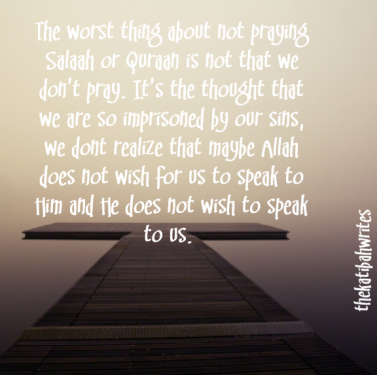
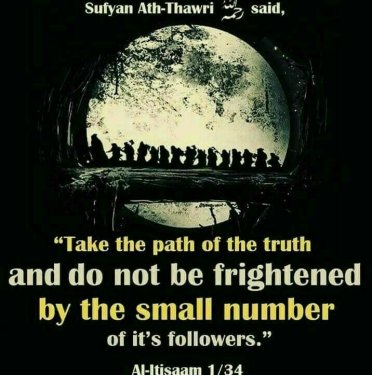
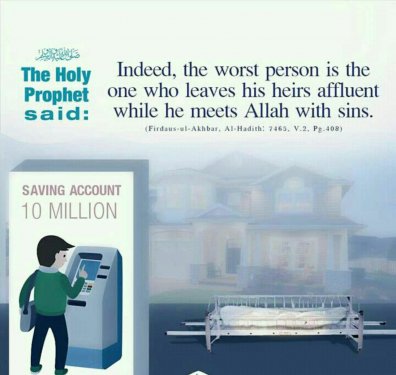

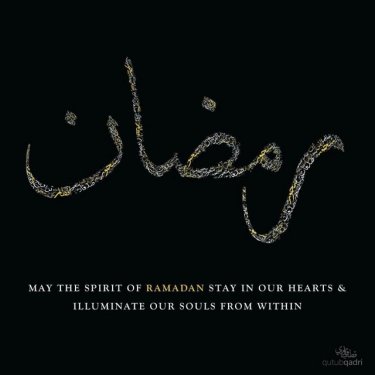

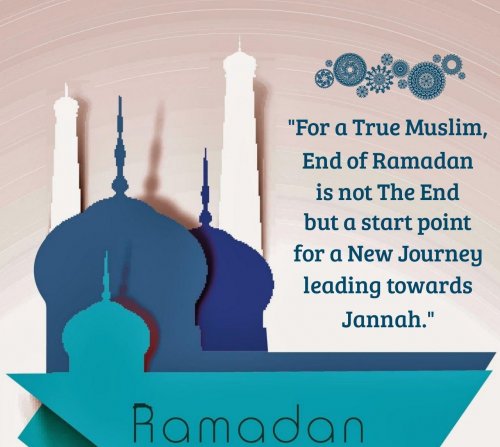

.thumb.jpeg.c8c19d4d0028f9494286e7e1b9c57da8.jpeg)